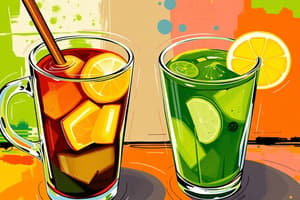Podcast
Questions and Answers
What is the ideal temperature range for steaming milk to make a latte?
What is the ideal temperature range for steaming milk to make a latte?
- 85-95C
- 95-105C
- 65-75C (correct)
- 55-65C
Which of the following is NOT a key component in making a latte?
Which of the following is NOT a key component in making a latte?
- Cocoa powder (correct)
- Espresso
- Steamed milk
- Microfoam
What is the purpose of holding back the foam when pouring the milk into the espresso shot?
What is the purpose of holding back the foam when pouring the milk into the espresso shot?
- To allow the microfoam to blend better with the espresso
- To create a layered appearance (correct)
- To prevent the foam from spilling over
- To maintain the temperature of the espresso
Which of the following is a key characteristic of microfoam in a latte?
Which of the following is a key characteristic of microfoam in a latte?
Which of the following cafs is mentioned in the text as a notable place to enjoy a latte?
Which of the following cafs is mentioned in the text as a notable place to enjoy a latte?
What is the key difference between a latte and a flat white?
What is the key difference between a latte and a flat white?
How does the Frothed Milk Latte differ from a traditional latte?
How does the Frothed Milk Latte differ from a traditional latte?
What is the origin of the term "caff latte"?
What is the origin of the term "caff latte"?
Which of the following cafs is known for its focus on sustainability and quality?
Which of the following cafs is known for its focus on sustainability and quality?
What is the main ingredient that distinguishes a macchiato from a latte?
What is the main ingredient that distinguishes a macchiato from a latte?
Which of the following variations combines chai tea and espresso?
Which of the following variations combines chai tea and espresso?
Study Notes
Latte is one of the most popular coffee drinks worldwide. This beverage has a unique flavor profile and is often enjoyed by people who want a delicious cup of coffee with some milk added to it. Let's delve into the world of latte, exploring its composition, preparation process, variations, historical background, and notable cafés where you can enjoy this tasty drink.
Ingredients
Latte is made from three main components: espresso, steamed milk, and microfoam. Espresso is brewed using finely ground coffee beans and water heated to around 95°C. Steamed milk is created by heating milk until it reaches roughly 65–75°C while maintaining small bubbles on the surface, which gives it a velvety texture. Microfoam is a combination of very small, tightly packed bubbles called nanofoam and larger foam bubbles called macromicrofoam. It provides the creamy layer on top of the latte.
Preparation
To make a perfect latte, follow these steps:
- Brew your shot of espresso.
- Heat the milk in a steam pitcher to around 160°F (71°C).
- Stir the milk to create microfoam texture and pour it into the espresso shot.
- Use a spoon or your finger to hold back the foam until you have about ⅛" of space left in the cup.
- Gently place the foam on top, allowing it to float for maximum visual appeal.
Variations
Latte is known for being adaptable to various tastes. Some popular variations include:
- Flat White: Similar to latte but with less milk, resulting in the espresso flavor being more prominent.
- Cappuccino: This variation features equal parts of espresso, steamed milk, and foam.
- Macchiato: An espresso shot with a small amount of foam on top.
- Frothed Milk Latte: Instead of using espresso, the milk is frothed until it reaches a thick consistency and poured over ice.
- Dirty Chai Latte: A combination of chai tea latte and an espresso shot.
History
The origins of latte can be traced back to Italy in the early 20th century. It was initially called "caffè latte," which translates to "coffee milk" in English. The drink gained popularity among Italians who wanted to enjoy their coffee with some extra creaminess provided by the added milk. Latte was later introduced to America in the 1980s and has since become a staple coffee drink across various cafés worldwide.
Popular Cafés
There are numerous cafés known for serving excellent latte drinks. Some popular options include:
- Starbucks: One of the largest chains worldwide, Starbucks offers a range of delicious lattes that cater to various tastes.
- Stumptown Coffee Roasters: Based in Portland, Oregon, this café is known for its high-quality beans and innovative coffee drinks.
- Blue Bottle Coffee: Another popular chain, Blue Bottle has a range of options that showcase unique flavors and high-quality ingredients.
- Intelligentsia Coffee & Tea: With locations across the United States, Intelligentsia delivers exceptional coffee experiences with a focus on sustainability and quality.
In conclusion, latte is a delightful coffee drink enjoyed by many around the world. Its versatile composition allows for various taste preferences, while its history highlights its origins and cultural significance. Whether you're a latte enthusiast or new to the world of coffee drinks, there are countless cafés offering delicious versions of this classic beverage.
Studying That Suits You
Use AI to generate personalized quizzes and flashcards to suit your learning preferences.
Description
Explore the fascinating world of latte, a popular coffee drink made from espresso, steamed milk, and microfoam. Learn about its ingredients, preparation process, variations, historical background, and discover notable cafés where you can savor this delightful beverage.




